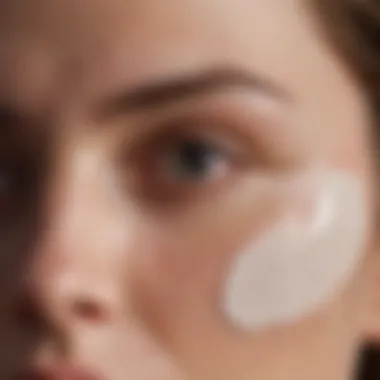Hydrocortisone Cream for Acne: Efficacy and Cautions


Summary of Objectives
This article aims to dissect the role of hydrocortisone cream in acne treatment. It focuses on its efficacy, potential side effects, and various clinical recommendations for its use within skincare routines. By appraising scientific literature, the discussion will enhance understanding regarding the appropriateness of hydrocortisone for managing acne.
Importance of the Research
Research on hydrocortisone cream is vital as it informs both practitioners and patients about its therapeutic potential. Acne is common and often causes significant emotional distress. Gaining insights into the use of corticosteroids like hydrocortisone can provide alternative solutions for those struggling with acne.
Intro
Acne remains a prevalent dermatological issue affecting countless individuals around the globe. Conventional treatments include topical retinoids and benzoyl peroxide, yet not all patients respond effectively. In this context, hydrocortisone cream emerges as a noteworthy option. It is a low-potency topical corticosteroid. Many patients seek alternatives when faced with the side effects of standard treatments. Hence, investigating the potential of hydrocortisone for treating acne is both timely and necessary.
Recent discussions highlight how hydrocortisone may reduce inflammation and thereby ease acne symptoms. However, its efficacy must be evaluated against possible risks. While hydrocortisone does exhibit anti-inflammatory properties, the nuances associated with its use should be understood clearly. The intention of this article is to illuminate these aspects, providing valuable knowledge for students, researchers, and healthcare professionals.
Results and Discussion
Presentation of Findings
Hydrocortisone cream, typically known for its anti-inflammatory properties, can play a role in managing acne-related inflammation. Studies suggest that when applied topically, it may decrease the size and redness of acne lesions. This effect can lead to a reduction in the psychological impact of acne.
Moreover, hydrocortisone’s mechanism involves the suppression of inflammatory mediators, which contributes to its effectiveness. Clinical studies indicate that low-potency corticosteroids can be beneficial when used judiciously, especially in inflammatory acne forms like papules and pustules.
Possible Side Effects
Some common side effects associated with hydrocortisone cream include:
- Thinning of the skin
- Development of dependent dermatitis
- Localized skin infections
Users must be cautious about prolonged use, as it may lead to adverse effects. Given these considerations, consulting with a dermatologist is crucial before integrating hydrocortisone into a skincare regimen.
Implications of Results
The research underscores the potential of hydrocortisone cream in acne treatment, particularly for inflammatory cases. However, its application should be approached with care. Patients should weigh benefits against possible side effects. The findings also advocate for further studies to expand understanding of long-term effects and optimal usage patterns.
Incorporating hydrocortisone cream in a broader skincare routine can be crafted with a balanced approach. Educating patients on proper application techniques and limitations is essential for ensuring safety and effectiveness. In that light, healthcare providers play a pivotal role in guiding patients through their skincare decisions.
Prolusion to Hydrocortisone Cream
Hydrocortisone cream serves as a topical corticosteroid widely used in dermatology. Its relevance in acne treatment often emerges from its anti-inflammatory properties. Given the nature of acne, which is marked by inflammation, understanding hydrocortisone's role can empower those seeking effective management strategies.
When discussing hydrocortisone cream, it is crucial to recognize its duality. While it alleviates symptoms like redness and swelling, it also requires measured usage, as improper application can lead to adverse effects. This balance is essential for achieving optimal results. The importance of hydrocortisone cream in this article lies in evaluating both the benefits and the potential risks associated with its use for acne.
What is Hydrocortisone?
Hydrocortisone is a synthetic version of cortisol, a hormone produced by the adrenal glands. It is classified as a corticosteroid and plays a significant role in reducing inflammation. When applied topically, hydrocortisone cream penetrates the skin and acts on the affected area. Its ability to modulate the immune responses at the site makes it effective for various skin conditions, including acne.
This medication is available in different strengths, which can influence its effectiveness and side effect profile. Understanding what hydrocortisone is fundamentally assists in grasping its utility in acne management.
Pharmacological Effects
The pharmacological effects of hydrocortisone are primarily attributed to its anti-inflammatory properties. It works by inhibiting the release of inflammatory mediators from cells. This ultimately leads to a decrease in local blood flow to the area and reduces redness, swelling, and discomfort associated with inflammation. Additionally, hydrocortisone can suppress the activity of immune cells that play a role in the inflammatory process.
It is important to note that these effects are dose-dependent. Higher concentrations may lead to more pronounced effects, but they also increase the risk of side effects. Therefore, it is essential to use hydrocortisone cream judiciously.
Common Uses Beyond Acne
Hydrocortisone cream is not limited to acne treatment. It finds utility in managing a range of dermatological conditions, such as:


- Eczema: It helps relieve the itching and swelling associated with eczema flare-ups.
- Psoriasis: It can reduce the severity of psoriasis plaques by decreasing inflammation.
- Contact dermatitis: It alleviates reactions to allergens and irritants.
- Allergic rashes: Reduces redness and inflammation from allergic reactions.
Furthermore, hydrocortisone is often used in combination with other treatments for enhanced efficacy. Understanding various applications beyond acne allows for broader insights into hydrocortisone's therapeutic scope.
Understanding Acne
Understanding acne is crucial in discussing hydrocortisone cream as a treatment option. Acne is a common skin condition that can lead to not only physical discomfort but also psychological distress. Grasping the underlying mechanisms, types, and contributing factors of acne provides a foundation for analyzing treatment options effectively. This section delves into the pathophysiology of acne, the various types of acne lesions, and the multifaceted factors that contribute to its development. Knowing these elements enhances one's approach to acne treatment, including the appropriate use of hydrocortisone cream.
Pathophysiology of Acne
Acne is primarily a result of inflammation in the sebaceous glands. These glands produce sebum, an oily substance that can clog pores, leading to a cycle of irritation and bacterial proliferation. The bacteria, particularly Propionibacterium acnes, are known to exacerbate inflammation. When sebum along with dead skin cells block hair follicles, it results in a favorable environment for these bacteria. The immune response to the infection contributes to the redness and swelling characteristic of acne lesions.
Recent studies suggest hormones play a significant role in acne development. Factors such as androgens increase sebum production, leading to more clogged pores. The understanding of this pathophysiology is key when considering hydrocortisone cream as it acts to reduce inflammation, potentially providing relief from the symptoms associated with severe and inflamed acne lesions.
Types of Acne Lesions
Acne can manifest in various forms, which can be broadly categorized into two groups: inflammatory and non-inflammatory lesions.
- Non-inflammatory lesions include:
- Inflammatory lesions include:
- Open comedones (blackheads): Due to clogged pores with a dark surface caused by exposure to air.
- Closed comedones (whiteheads): Blocked pores that remain beneath the skin surface, appearing as tiny white bumps.
- Papules: Small, red, tender bumps.
- Pustules: Similar to papules but filled with pus.
- Nodules: Large, painful lumps beneath the skin’s surface.
- Cysts: Deep, painful pus-filled lumps, often leading to scarring.
Recognizing these types is important for determining the appropriate treatment strategy. Hydrocortisone cream may help alleviate inflammation, particularly for the papular and pustular forms, but caution is essential as it might not be suitable for all types of acne lesions.
Contributing Factors to Acne Development
Acne's development is influenced by several factors. Key contributors include hormonal fluctuations, particularly during puberty, menstruation, and hormonal therapies. Other significant factors are:
- Genetic predisposition: A family history of acne can increase susceptibility.
- Diet: High glycemic index foods and dairy products may exacerbate acne for some individuals.
- Stress: It impacts hormonal levels and can lead to increased oil production.
- Certain medications: Some drugs can trigger or worsen acne.
- Skin Care Products: Comedogenic products can contribute to pore blockages.
These contributors highlight the multifaceted nature of acne and the need for a comprehensive management approach. Understanding these factors can empower individuals to take proactive measures in acne management, ultimately leading to better outcomes whether incorporating treatments like hydrocortisone cream or other options.
Hydrocortisone Cream and Acne Treatment
The use of hydrocortisone cream in acne treatment represents a nuanced approach to managing this common dermatological condition. This section details the effectiveness, mechanisms, and research surrounding hydrocortisone cream's role in alleviating acne symptoms. For many, acne is not just a cosmetic issue but a challenge that affects self-esteem and overall quality of life. It becomes essential to explore alternatives and adjunctive treatments alongside traditional therapies.
Mechanism of Action in Acne
Hydrocortisone is a corticosteroid with anti-inflammatory properties. When applied topically, it interacts with skin cells in various ways. It primarily reduces inflammation by inhibiting the production of inflammatory cytokines. The application of hydrocortisone can decrease redness, swelling, and discomfort associated with acne lesions. Furthermore, its ability to decrease inflammatory responses means that it can help prevent the formation of new lesions in susceptible skin.
- Inhibiting the release of histamines and preventing the immune system from overreacting can provide relief.
- It can also help in controlling excess sebum production, a contributing factor to acne.
It is important to note that while helpful, hydrocortisone cream should not be viewed as a primary treatment for acne. Instead, it serves better as a supplementary treatment for acute flare-ups or severe inflammation.
Efficacy in Treating Inflammation
Research suggests that hydrocortisone cream is effective in reducing inflammation associated with acne. Patients experiencing painful, swollen acne cysts or pustules often find that hydrocortisone provides significant relief. Studies have demonstrated that topical hydrocortisone can lead to rapid improvement in skin condition within days.
- Relief from inflammation can also lead to less scarring in the long term.
- Decreasing redness around acne lesions can provide a more even skin tone, enhancing patient satisfaction.
Furthermore, its utility in acute situations makes hydrocortisone a valuable option, especially for individuals who may have allergic reactions or are dealing with irritation from other acne treatments.
Clinical Studies on Hydrocortisone for Acne
While there are limited extensive clinical studies specifically isolating hydrocortisone's effects on acne, available research indicates its potential benefits. Some studies highlight that short courses of hydrocortisone creams can lead to favorable outcomes in terms of inflammation reduction and overall skin health.


"Hydrocortisone provides prompt relief in acne inflammation, although it is not a standalone treatment."
Most recommendations suggest it as part of a broader regimen, particularly for inflammatory acne types. More research is needed to establish definitive guidelines on dosage and duration of use, but current findings position hydrocortisone as a significant tool in acne management.
In summary, understanding the mechanisms, efficacy, and clinical backdrop of hydrocortisone's application sheds light on its potential role in treating acne. As research continues to develop, it remains crucial to contextualize hydrocortisone within a comprehensive acne treatment plan.
Potential Benefits of Hydrocortisone Cream for Acne
Understanding the potential benefits of hydrocortisone cream in acne management is crucial for both individuals experiencing this condition and healthcare professionals involved in its treatment. Hydrocortisone is a corticosteroid with anti-inflammatory properties that can address certain inflammatory components of acne. This section highlights key considerations for its application, focusing on the clinical advantages and practical aspects related to its use in treating this skin condition.
Reducing Inflammation and Redness
One of the most significant benefits of using hydrocortisone cream for acne is its ability to reduce inflammation. When the skin experiences an acne flare-up, many individuals notice swelling and redness surrounding the affected areas. These symptoms result from the body's immune response to bacterial invasion and sebum buildup.
The application of hydrocortisone can lead to a decrease in the severity of these symptoms. By inhibiting the function of immune cells that contribute to inflammation, hydrocortisone not only soothes the affected area but also helps to minimize the appearance of redness.
For optimal results, clinicians often suggest a short-term application of hydrocortisone cream, typically limited to a few days. Extended use can lead to adverse effects, such as skin thinning, which is why it's important to use it judiciously.
In addition, one study found that the combination of light therapy with hydrocortisone showed not only reduced inflammation but also enhanced overall skin healing, which underscores the potential of this treatment when used properly.
Short-term Relief for Acne Flare-ups
Another recognized benefit of hydrocortisone cream for acne management is its capacity to provide short-term relief during acute flare-ups. Adolescents and adults alike often find that sudden outbreaks can be distressing. In these moments, hydrocortisone can serve as a quick intervention to alleviate discomfort and visual prominence.
The cream’s fast-acting nature allows users to mitigate pain or irritation associated with inflamed lesions. Furthermore, by reducing the inflammatory response, users may see quicker healing times and a decrease in the likelihood of secondary infections.
For individuals struggling with acne and its social or emotional repercussions, this immediate relief can be of great value.
However, it is essential to note that while hydrocortisone cream can provide prompt and effective relief, it should not be viewed as a standalone solution. Integrating it into a comprehensive skin care regimen that includes cleansing and topical treatments targeting acne-causing bacteria and excess sebum is vital for achieving sustainable outcomes in acne management.
"Hydrocortisone is not a definitive cure for acne, but it serves as a useful tool for managing acute inflammation and promoting recovery."
In summary, the application of hydrocortisone cream can reduce inflammation and offer immediate relief during difficult flare-ups. However, caution is necessary to avoid long-term consequences, making informed usage essential.
Risks and Considerations
Understanding the risks and considerations associated with hydrocortisone cream is crucial for anyone looking to use this corticosteroid in managing acne. Its anti-inflammatory properties may provide relief, but it is important to be aware of potential drawbacks and side effects. This section will elaborate on the implications of prolonged use and the specific complications that might arise, informing users of necessary precautions.
Potential Side Effects
Hydrocortisone cream is generally well-tolerated, but it may come with several side effects that users should consider. Commonly reported adverse effects include:
- Skin irritation: This can manifest as redness or a burning sensation after application.
- Allergic reactions: Some individuals may develop contact dermatitis, leading to a rash or itchiness.
- Acne flare-ups: Ironically, while aiming to treat acne, some users might find their condition worsens due to the cream's ingredients.
It is crucial to monitor skin responses closely. If severe irritation occurs, discontinuation of the cream may be necessary. Always consult a medical professional if any troubling symptoms arise after use.
Risk of Skin Thinning
One prominent concern linked with prolonged application of topical corticosteroids, including hydrocortisone, is skin thinning, or atrophy. Over time, skin may lose its elasticity, which can lead to:
- Increased fragility: The skin becomes more prone to bruising or tearing.
- Visible capillaries: Users may notice spider veins or discoloration.
- Reduced barrier function: Thinner skin can allow harmful pathogens to penetrate more easily, potentially leading to infections.
Hence, it is advisable to limit the duration of use and adhere to recommended dosages to mitigate this risk.
Hormonal Implications
The use of hydrocortisone cream may also affect hormonal balance in some individuals, especially when used excessively. Corticosteroids can influence adrenal hormone levels, possibly resulting in:
- Adrenal suppression: This might cause the body to produce less cortisol, a hormone essential for various bodily functions.
- Hormonal fluctuations: Prolonged use may lead to changes in menstrual cycles in women or affect testosterone levels in men.
Due to these implications, it is wise to limit usage and involve a dermatologist when managing persistent acne. Awareness and proper management can prevent these risks from affecting overall health.
"It's essential to weigh the benefits of hydrocortisone cream against its potential risks, particularly with respect to prolonged usage."


Guidelines for Use
Understanding how to properly use hydrocortisone cream is essential for harnessing its benefits while minimizing potential risks. The guidelines dictate the usage, dosage, and duration for which this topical treatment should be applied. Misuse or overuse can lead to adverse effects, making it crucial to follow established recommendations closely. Health professionals usually emphasize correct application methods to ensure efficacy without inflicting harm to sensitive skin, especially in acne-prone areas.
Recommended Dosage and Application
For optimal results, a thin layer of hydrocortisone cream should be applied directly to the affected skin area. Following are key points regarding dosage and application:
- Dosage: Recommended dosage often depends on the specific formulation of the cream, usually ranging from 0.5% to 2.5%. Typical guidelines suggest using a small, pea-sized amount for spot treatment.
- Application Frequency: It is commonly advised to apply hydrocortisone cream two to four times daily. However, the frequency may vary based on individual skin reactions and the advice of a healthcare professional.
- Technique: Gently massage the cream into the skin using clean fingers. Ensure the area is clean and dry for better absorption.
Duration of Use
The duration for using hydrocortisone cream is another critical aspect that requires attention. Prolonged usage can lead to various side effects, including skin thinning and hormonal disruptions. Here are some considerations:
- Short-Term Use: Hydrocortisone is generally recommended for short-term use, ideally not exceeding two weeks for treating acute flare-ups.
- Tapering Off: Gradually reducing the frequency of application is advisable; for example, moving from daily use to every other day can help in minimizing withdrawal effects.
- Monitoring Skin Condition: Continuous assessment of the skin condition is necessary. If there is no improvement after one to two weeks, it may be wise to consult with a healthcare professional.
When to Consult a Dermatologist
Consulting a dermatologist is crucial when using hydrocortisone cream for acne. Certain signs indicate that professional intervention is necessary:
- Persistent Acne: If acne does not respond to treatment after using hydrocortisone as directed, it might be a sign that a different therapeutic approach is needed.
- Side Effects: Should any adverse reactions occur, such as increased redness, burning, or stinging, it is essential to seek medical advice.
- Severe Acne Forms: For those with cystic or nodular acne, referral to a dermatologist is advised, as these types may require more aggressive treatment modalities.
"Consulting a healthcare professional can help determine if hydrocortisone cream is appropriate for your specific skin condition."
Alternative Options for Acne Treatment
Exploring alternative options for acne treatment is crucial, especially for those who might experience limited effectiveness or undesirable side effects from hydrocortisone cream. Understanding these alternatives allows individuals to find the most suitable and effective treatment plan for their skin. Various methods exist, from topical treatments to systemic medications and lifestyle adjustments. Each has its unique benefits and considerations, and assessing these can greatly improve the overall management of acne.
Topical Treatments
Topical treatments are often the first line of defense against acne. Options include benzoyl peroxide, salicylic acid, and retinoids. These agents function differently to address various types of acne lesions.
- Benzoyl Peroxide: Known for its antibacterial properties, it effectively reduces acne-causing bacteria on the skin. It also helps to unclog pores, making it particularly useful for inflammatory acne.
- Salicylic Acid: This beta hydroxyl acid helps to exfoliate the skin and prevent pore blockages. It penetrates into the pores to dissolve excess oil and dirt, making it effective for blackheads and whiteheads.
- Retinoids: Derived from Vitamin A, these compounds are effective in preventing blocked pores and promoting skin cell turnover. They can diminish existing acne and improve post-acne scars, offering anti-aging benefits as a bonus.
Using these treatments often requires patience, as results can sometimes take several weeks. It's also important to consider potential side effects, such as dryness or irritation, especially with strong formulations.
Oral Medications
For more severe cases of acne, oral medications may be necessary. These can include antibiotics, hormonal treatments, and isotretinoin.
- Antibiotics: Medications like doxycycline and minocycline can reduce inflammation and bacterial growth when applied systemically. They may be suitable for those with moderate to severe acne.
- Hormonal Treatments: For women experiencing hormonal acne, contraceptives that regulate hormones can often help clear the skin by minimizing oil production and addressing hormonal fluctuations.
- Isotretinoin: This powerful medication is reserved for severe cystic acne. It significantly reduces sebum production and has a long-lasting impact. However, it requires careful monitoring due to potential side effects.
Choosing an oral medication should involve a conversation with a healthcare provider, focusing on individual health needs and possible risks.
Lifestyle Modifications
Lifestyle changes can significantly support acne treatment. Certain habits can exacerbate acne, while positive adjustments can foster healthier skin.
- Diet: What you eat can affect your skin. Diets high in sugars and dairy might trigger or worsen acne. Focusing on a balanced diet with whole foods, fruits, and vegetables might be beneficial.
- Skin Care Routine: Regular cleansing and moisturizing are essential. Utilize non-comedogenic products that do not clog pores.
- Stress Management: Stress can trigger hormonal changes that worsen acne. Engaging in relaxation techniques like yoga, meditation, or exercise can help maintain balance and manage skin health.
Making these lifestyle alterations can be a foundation in effectively managing acne alongside other treatments.
The End
The conclusion of this article encapsulates the critical findings regarding the use of hydrocortisone cream in acne management. Recognizing its role in treating acne is vital for both the layperson and the medical professional. By summarizing key points and considerations, this section provides clarity about when and how hydrocortisone can be integrated into acne therapies.
Summary of Hydrocortisone Cream Use in Acne Management
Hydrocortisone cream has established itself as a useful topical steroids treatment option for certain types of acne, particularly those involving significant inflammation. Its anti-inflammatory properties help mitigate redness and swelling, providing temporary relief during flare-ups. It is important to note that while this cream may offer rapid results in reducing acute symptoms, it should not be seen as a cure for acne. The guidelines dictate limited use to avoid potential side effects such as skin thinning. Patients are encouraged to incorporate hydrocortisone into a broader dermatological regimen, ideally under the guidance of a healthcare provider.
Future Research Directions
The landscape of acne treatment continues to evolve. Future research should explore a variety of avenues, including:
- Long-term effects of hydrocortisone: Understanding how extended use impacts skin health and effectiveness in chronic acne
- Comparative studies: Evaluating hydrocortisone's efficacy against other topical agents, like benzoyl peroxide or retinoids
- Personalized treatment: Investigating how individual skin types respond differently to hydrocortisone, paving the way for tailored treatments
- Alternative delivery methods: Exploring formulations that might enhance absorption or minimize side effects















